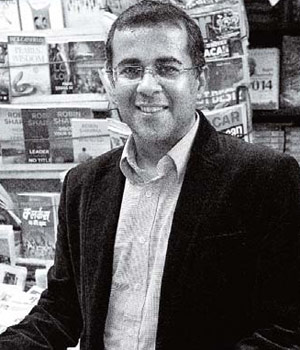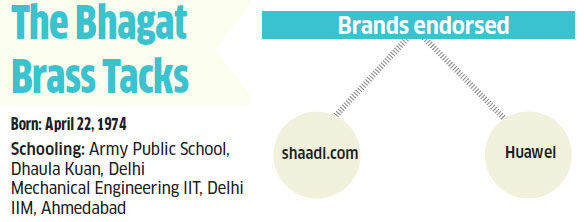Chetan Bhagat
This is a collection of articles archived for the excellence of their content. Readers will be able to edit existing articles and post new articles directly |
Chetan Bhagat: India's Dan Brown or Charles Dickens?
By Samanwaya Rautray, ET Bureau | 21 Jul, 2013
Contents[hide] |
A profile
He is India's first-ever superstar writer, someone who has broken the barrier between vernacular and English writing. He has made reading a cool thing among India's millions of youngsters.
He has rewritten the rules of the publishing industry. His latest book, Half Girlfriend, could afford a full first page pre-release advertisement in national newspapers and had an unheard of 2 million initial print run.
Almost all his book adaptations for the big screen have become blockbusters, including 2 States and Kick in 2014. Sometimes he travels to exotic destinations to write, though he maintains could do it in his study too.
Success mantra
Be in sync with the times.
His epitaph
"I don't want to be remembered. I want to be missed."
History
His publisher, Rupa, would have us believe that the Chetan Bhagat revolution is here. The figures tell the story, says managing director Kapish Mehra. All his books so far have sold over a million copies each. His last, Revolution 2020, sold a million copies in 100 days, a record of sorts in Indian publishing history, Mehra says.
Three of his books have already been made into movies. Two others have just been snapped up by Bollywood producers. He has a phenomenal fan following of two million on Facebook and Twitter, enough to entice any big brand. Shaadi. com promotes its website with the tagline: Love, arranged shaadi.com, in association with India's best-selling author Chetan Bhagat.
They couldn't have asked for a better narrator, the go-between in the traditional Indian set-up. He's also brand associate of Chinese tech giant Huawei Technologies, a motivational speaker and a scriptwriter. The man, himself, is pretty earnest and straight-talking.
"I did not expect the level of popularity. Frankly there was no benchmark in India for a writer as such, and, like any other aspiring writer, I was trying to get published," he says and admits to being "full of anxiety" when he left his lucrative bank job to follow his heart.
First book
"I started an upbeat book, to get over the blues — 2 States: The Story of my Marriage. The book worked and there was no looking back." "Lucky," he says, a theory Mehra discounts. "Chetan Bhagat is no shortlived phenomenon. He's a revolution. Indian publishing will henceforth always be defined in terms of the pre- and post-Chetan Bhagat era," he says. "He's dominated the Indian publishing scene for a decade now. He would well dominate the next few."
Publishing houses and commissioning editors have been trying desperately to scout around for his successor, but there's no one like him around. "He's got a huge connect with his readers. That can't be matched," points out Mehra.
Carping Critics
His critics though carp about his characters, his language (more Hinglish than English), the plots, and what have you. "Thankfully the number of people who like my work far outnumber those who don't, even though the former may be less 'vocal' than the haters," Bhagat says. Mehra recounts with much nostalgia the Saturday evening his parents went out for dinner and he picked up the manuscript of Bhagat's Five Point Someone. "I was reading till midnight. I couldn't put it down."
Bhagat's contemporaries, however, are cagey about talking about him. The constant sniping over his Hinglish prompted Bhagat to tweet recently: "I don't write in Hinglish. Simple English yes. Hinglish, no." Possibly, Bhagat himself is unconsciously at war with his own success story, aspiring to be more India than Bharat, unaware of the bridge he's inadvertently been building between the two Indias.
Hinglish
One can't blame him; in the right classes in India English is still spoken with proper accent and intonation. Anyone who can't is an upstart, a wannabe. Something that Bhagat, with his middle-class upbringing and his aspirational career graph, is clearly uncomfortable with. He's no small-town boy and he did go to IIT and IIM, picked up a well-paid bank job to give it all up for writing. But his unprecedented success may change things. It has already spawned a million copycats.
A few years hence, Hinglish, now restricted to our quaint song and dance Bollywood routines and the ad world, may soon become an acceptable idiom, like American English, African English and Creolised English. An anthology, published by Penguin, Chutnefying English: The Phenomenon of Hinglish, traces its origins to Mumbaiya Hindi and the irrepressible Shobhaa De, who started off a trend of sorts. Bhagat has only taken off where she stopped, making Indian English a more acceptable new age young medium of communication.
Hinglish? Why Not?
Urvashi Butalia, co-founder of Kali for Women, India's first feminist publishing house, says that there are many others now writing in Hinglish. "There's nothing to be apologetic about Hinglish," she says, "especially when it's paying." Butalia says serious attention needs to be paid to the commonalities and democratisation taking place through Hinglish.
"One of the changes that has taken place in the last decade in English language writing and publishing has been the entry of Hinglish, starting with Salman Rushdie's use of Indian words in Midnight's Children [and his refusal to italicise them], to the influx of a bunch of Indian authors who write with Indian words, drawing from their mother languages," she says.
"It has created a lot of problems for publishers and editors; we are schooled in old English and suddenly people are writing what seems to be 'bad' English," she adds. "But it has opened up the market to new writers, readers and buyers."
Small-town Angst
Bhagat's youth are mostly small-town kids, unable to completely shake off the old, and struggling to adapt to the new; a world in which love marriages still raise eyebrows, but a new permissiveness is in the air. Their parents may disapprove, but their new-found prosperity has made them more daring. Bhagat captures this middle class, upwardly mobile youth's angst, aspirations and hopes like no one can — his writings reflect the chaos, the confusion and the dreams of a youth swept off their feet by globalisation.
Youth with seamless mobile connectivity who stride across the rural-urban divide, youth who couldn't be bothered if their spellings are all mixed up. A world in which no one's bothered about Wren and Martin. The youth, who Bhagat believes, only aspire for a job and a girlfriend. He isn't targeting the high-brow or the intellectual. His books, priced still at a ridiculous Rs 140, are there to cheer, inspire, educate and invigorate them as they take off on their journey to a better life.
Brand Bhagat
His success has had other unexpected spinoffs. His immense popularity makes him a natural choice of many brands. He's in demand as a motivational speaker. His brand value is his appeal, his instant connect to the youth. Brand expert Harish Bijoor says Bhagat's appeal as a brand is through his books, his characters. He resonates well with young India, but he needs to be more cautious in choosing the brands he endorses, referring to the disparate brands in his kitty. "You don't only endorse the brand, the brand also endorses you. He needs to correct that."
As a youth icon, he's had to take positions on all contemporaneous issues, frequently attracting controversies. His articles "Five Things Women Need to Change about Themselves" created a storm as did his recent "Letter from an Indian Muslim Youth". Such controversies, Bijoor says, can only create brand awareness, but may not translate into brand interest.
"If the controversy is created by something he's written — that he strongly believes in — it may," he says. "But it's more important to position yourself as a solid brand." Bhagat says he doesn't court controversy. "I don't design controversies and I refrain from personal attacks. I do want to spark a debate and provoke people to think as well."
National identity: If Only Things Were So Simple
He has no pretensions about being an expert on either issue. "I am just expressing my views and not claiming anything else... am not claiming to be a leader, authority or expert of any such position...," he says. "What I try to do is genuinely care." He also denies harbouring any political aspirations. "As of now, I think, India needs a sense of national identity in its people, which almost supersedes the regional and religious one. If that's called nationalist, so be it." Too simplistic a world view, perhaps?
Javed Anand, general secretary of Muslims for Secular Democracy, says: "I share the sentiments and views of young Indian Muslims in response to Chetan Bhagat's silly article, presuming to speak for them. Bhagat's article is ample proof of his shallow mind, prone to quick-fix solutions to complex issues he barely understands. What is apparent from the article is his pomposity and patronising attitude towards a community he can only comprehend through stereotype."
As a writer, Bhagat reflects the aspirations of the first-generation English reader, who converses more in a local language with only a smattering of English words thrown in, not the third-generation English reader who would much rather speak the Queen's English. The delightful irony is that Bhagat's idols include Hemingway, Dickens and Orwell. And millions of his fans will vouch that his works are indeed A Moveable Feast.
Screen adaptations of Bhagat’s novels
Chetan Bhagat’s journey from books to the box office
Garima Sharma,TNN | Apr 22, 2014
Author Chetan Bhagat seems to have found his creative foil in cinema. A year after Kai Po Che, based on his novel The 3 Mistakes Of My Life, the film adaptation of his work 2 States has found appreciation. And the contemporary author, who pens stories for young India, is already busy working on his next two films — Salman Khan-starrer Kick, which he has co-written and the film adaptation of his novel, Revolution 2020.
Constantly backed by UTV Motion Pictures in his film endeavours, Chetan says he feels a karmic connection with them. Besides producing Kai Po Che, the studio has distributed 2 States and is set to release Kick on Eid. Currently, they are developing the film based on Revolution 2020, which will be helmed by director Rajkumar Gupta (Aamir, No One Killed Jessica). The studio, which has backed entertaining, relevant and commercially viable films like Dev.D, A Wednesday, Khosla Ka Ghosla, Barfi, Paan Singh Tomar, Udaan and the recent National award winners Shahid and Ship Of Theseus, found a voice similar to its own with Chetan.
Says Siddharth Roy Kapur, Managing Director, Disney India, "A great story told well has the ability to travel across mediums. We are excited to continue our association with Chetan to create refreshing cinema." Adds Chetan, "I love how they understand the business, package their films and conduct themselves. The fact that they have backed four films I am a part of, means they also like my work and our sensibilities match. I find a lot of comfort in working with them. We now have Kick and the Revolution 2020 adaptation, based on one of my highest-selling novels. I can't wait for them to start casting for it." The film goes on the floors in mid-2014.

